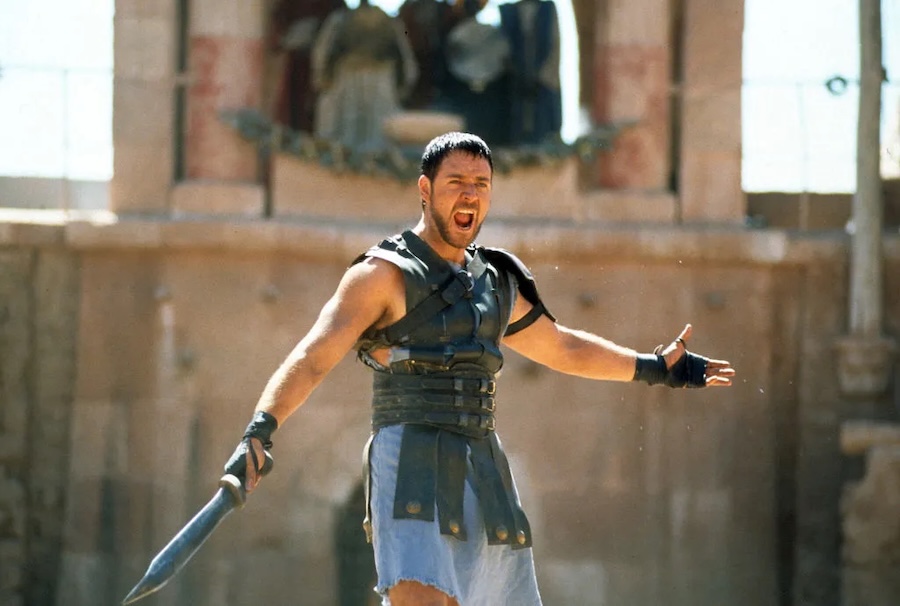
WHAT WE DO IN LIFE ECHOES IN ETERNITY.

Gladiator is one of those films that opened as early as May, without all that much fanfare, and then kept building until the Oscars many months later where it went on to win the Best Picture award. That is a rare thing these days among Oscar winners, which are generally released much later in a year. Gladiator also helped resurrect director Ridley Scott’s career, launched Russell Crowe as one of Hollywood’s hottest stars and inspired works such as TV’s Rome.
Defeating barbarians in Germania
The year is 180 AD. Roman general Maximus Decimus Meridius (Crowe) and his army are defeating the barbarians of Germania. Emperor Marcus Aurelius (Richard Harris), who has known Maximus for many years, congratulates him and makes him an offer. He can’t rely on his son to succeed him; Commodus (Joaquin Phoenix) doesn’t have it in him to be a strong and wise leader of Rome. Marcus wants Maximus to be a temporary leader before power of the state is returned to the Senate. However, when the dying Emperor tells his son that he shall not be his successor, Commodus is heartbroken and smothers his father to death.
That gives him the opportunity to strike at Maximus since no one else knows about Marcus’s decision. The general is arrested, but escapes his own execution only to find his wife and daughter murdered in Spain. The broken Maximus is eventually found by slave traders who take him to North Africa where he’s trained to become a gladiator. Maximus eventually returns to Rome as part of a group of gladiators that will fight in the greatest arena of them all – the Colosseum.
Rome as never seen before
One is easily reminded of old films like The Fall of the Roman Empire and Spartacus – this one has the same kind of power struggles, but director Scott used modern technology to recreate Rome in a grand way that had not been seen before. One gets a sense of the size of the Colosseum and why it was such a compelling place to visit, but also how brutal the games inside were.
The opening sequence, the battle in the Germanian forests, is a shocker, a lesson in Roman warfare, exciting and chillingly bloody. Its depiction of war is almost pornographic in a way, sacrifice and mayhem shot in earthy tones. One shouldn’t make the mistake of trusting too many details in the script; the writers based the characters loosely on real people, but changed things as they saw fit. Crowe is certainly the perfect choice for a perfect hero, a general who is a wise, courageous, strong and principled leader. He is counterbalanced by Phoenix who plays the complete opposite, a man who is cowardly, conspiratorial, bloodthirsty and even incestuous; it’s easy for the actor to chew the scenery a bit, but he’s nonetheless very effective.
Hans Zimmer and Lisa Gerrard’s score takes turns being muscular and emotional.
The stars are ably supported by the British pros, including Oliver Reed in his final performance. Hans Zimmer and Lisa Gerrard’s score takes turns being muscular and emotional; fitting the movie perfectly, it has become one of Zimmer’s most popular.
Strength and honor, that’s what it’s all about. One can scoff at the platitudes and the pompous masculinity, but the film is so powerful that it is likely to inspire not a few members of the audience into thinking that they would stand with Maximus on the battlefield. The idolization of a leader on whom an empire depends is dangerous and fragile. He could be a Maximus… but he could also be a Commodus.
Gladiator 2000-U.S. 154 min. Color. Widescreen. Directed by Ridley Scott. Screenplay: David Franzoni, John Logan, William Nicholson. Cinematography: John Mathieson. Music: Hans Zimmer, Lisa Gerrard. Art Direction: Arthur Max. Editing: Pietro Scalia. Costume Design: Janty Yates. Cast: Russell Crowe (Maximus Decimus Meridius), Joaquin Phoenix (Commodus), Connie Nielsen (Lucilla), Oliver Reed, Derek Jacobi, Djimon Hounsou, Richard Harris, David Hemmings.
Trivia: Also available in a 171 min. version. Mel Gibson, Antonio Banderas and Tom Cruise were considered for the part of Maximus; Jude Law as Commodus. Followed by Gladiator II (2024).
Oscars: Best Picture, Actor (Crowe), Costume Design, Visual Effects, Sound. BAFTA: Best Film, Cinematography, Editing, Production Design. Golden Globes: Best Motion Picture (Drama), Score.
Quote: “My name is Maximus Decimus Meridius, Commander of the Armies of the North, General of the Felix Legions, loyal servant to the true emperor, Marcus Aurelius. Father to a murdered son, husband to a murdered wife. And I will have my vengeance, in this life or the next.” (Crowe)
Last word: “Originally we went to Germany to shoot the opening scenes, then relocated to the U.K. when we discovered that a section of forest near Galway airport was going to be razed for construction. The owners of the land said it would be cheaper if we burned it down than if they cut it down, so they said ‘come in and do what you like.’ We were able to shoot a lot of the film there, and did the entire opening in just three weeks. Any time you change locations, you’re costing yourself a great deal of time and money, so it helps if you can contain it.” (Scott, The Hollywood Interview)
